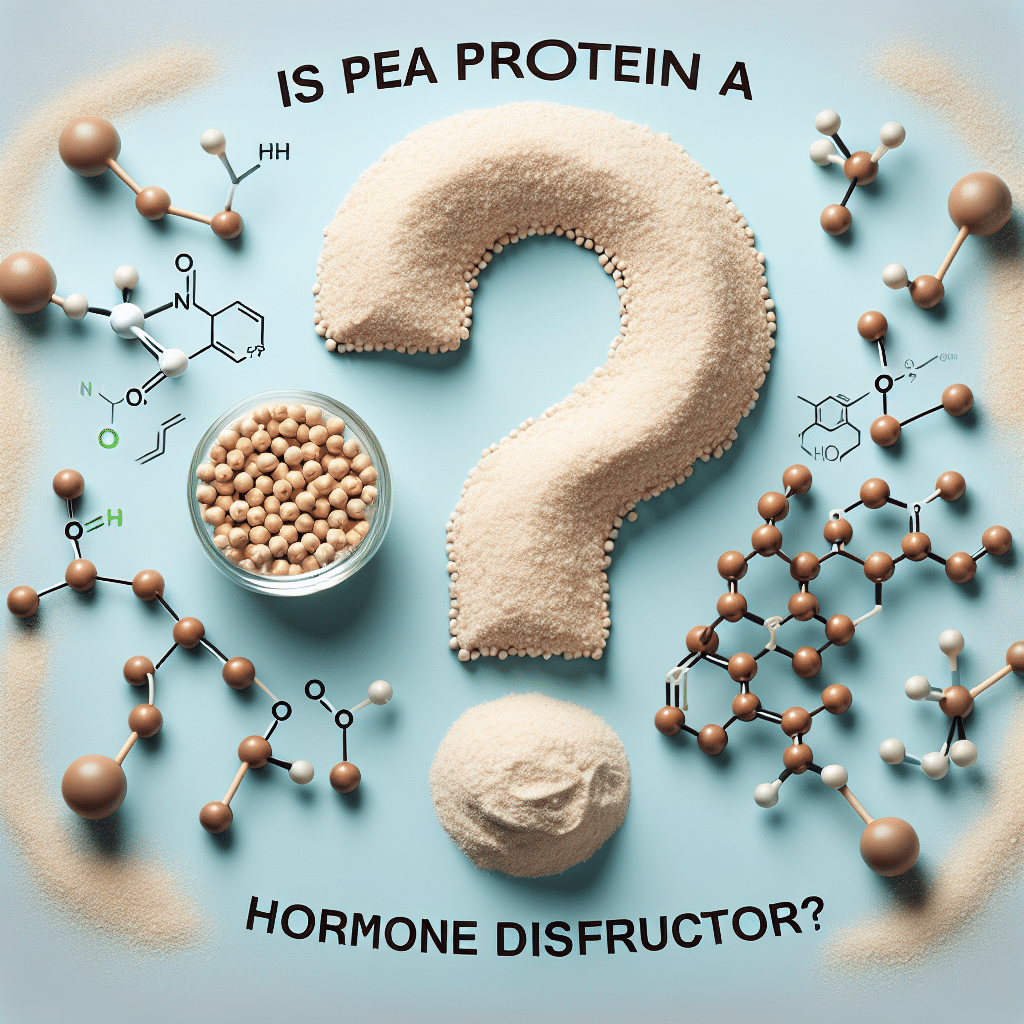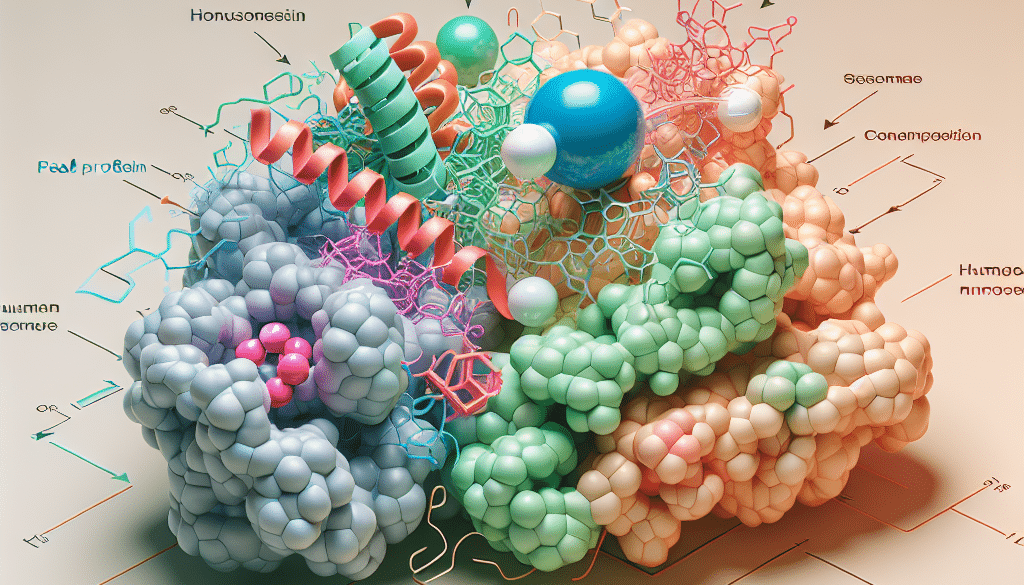Is Pea Protein A Hormone Disruptor? Learn More
Table of Contents
- Pea Protein: Examining Its Impact on Hormonal Health
- Understanding Pea Protein and Its Nutritional Profile
- The Hormonal Implications of Dietary Proteins
- Is Pea Protein a Hormone Disruptor?
- Phytoestrogens: A Closer Look
- Research on Pea Protein and Hormones
- Case Studies and Anecdotal Evidence
- Comparing Pea Protein to Other Protein Sources
- Best Practices for Consuming Pea Protein
- Conclusion: Pea Protein’s Role in Hormonal Health
- Discover ETprotein’s Premium Pea Protein Products
Pea Protein: Examining Its Impact on Hormonal Health

Pea protein has emerged as a popular plant-based alternative to animal-derived proteins, especially among vegetarians, vegans, and those with dietary restrictions. Its rise in popularity is due to its high protein content, amino acid profile, and perceived health benefits. However, with the increasing consumption of pea protein, concerns have been raised about its potential as a hormone disruptor. This article delves into the scientific evidence to address these concerns and provide a comprehensive understanding of pea protein’s impact on hormonal health.
Understanding Pea Protein and Its Nutritional Profile
Pea protein is derived from yellow split peas and is processed to remove the majority of carbohydrates and fats, leaving a protein-rich powder. It is favored for its hypoallergenic properties and is free from common allergens such as gluten, soy, and dairy. Pea protein contains all nine essential amino acids, although it is slightly lower in methionine.
The Hormonal Implications of Dietary Proteins
Proteins, regardless of their source, can influence hormone levels in the body. They play a crucial role in the synthesis of hormones and the regulation of hormonal functions. The concern with plant-based proteins, like pea protein, arises from the presence of bioactive compounds that could potentially affect hormone balance.
Is Pea Protein a Hormone Disruptor?
The term “hormone disruptor” refers to substances that can interfere with the endocrine system, which is responsible for hormone production and regulation. These disruptors can mimic or inhibit hormones, leading to imbalances and health issues. To determine if pea protein acts as a hormone disruptor, it is essential to review scientific studies and clinical evidence.
Phytoestrogens: A Closer Look
One of the primary concerns with plant-based proteins is the presence of phytoestrogens, plant-derived compounds that can mimic the effects of estrogen in the body. However, pea protein contains negligible amounts of phytoestrogens compared to other plant proteins like soy. The low phytoestrogen content in pea protein makes it an unlikely candidate for hormonal disruption related to estrogen activity.
Research on Pea Protein and Hormones
Studies on pea protein have primarily focused on its effects on muscle growth, satiety, and weight management, with limited research directly addressing its impact on hormones. The available evidence does not support the claim that pea protein is a hormone disruptor. In fact, some studies suggest that pea protein may have beneficial effects on blood pressure and kidney health, which are indirectly related to hormonal regulation.
Case Studies and Anecdotal Evidence
While scientific research is limited, anecdotal evidence from individuals consuming pea protein has not indicated a trend of hormonal imbalances. Case studies are also lacking in reports of pea protein causing endocrine disruption. However, it is important to consider individual sensitivities and consult with a healthcare provider if concerns arise.
Comparing Pea Protein to Other Protein Sources
When evaluating the potential hormonal effects of pea protein, it is helpful to compare it to other protein sources. Animal-based proteins, such as whey and casein, have been associated with hormonal changes due to their natural hormone content. Soy protein, another popular plant-based option, contains higher levels of phytoestrogens, which have been more closely scrutinized for their hormonal effects.
- Animal Proteins: May contain hormones or hormone-like substances from the animals they are derived from.
- Soy Protein: Contains isoflavones, a type of phytoestrogen that can have estrogenic activity.
- Pea Protein: Low in phytoestrogens and other compounds known to affect hormone levels.
Best Practices for Consuming Pea Protein
To minimize any potential risks and maximize the health benefits of pea protein, it is advisable to consume it as part of a balanced diet. Moderation is key, and diversifying protein sources can help ensure a comprehensive nutrient intake without over-reliance on a single protein type.
Conclusion: Pea Protein’s Role in Hormonal Health
The current body of scientific evidence does not support the notion that pea protein is a hormone disruptor. Its low phytoestrogen content and lack of adverse hormonal effects reported in research make it a safe and healthy protein choice for most individuals. As with any dietary supplement or protein source, it is essential to consider personal health conditions and dietary needs.
Discover ETprotein’s Premium Pea Protein Products
If you’re looking for high-quality pea protein, ETprotein offers a range of organic and non-GMO pea protein products that are allergen-free and boast a neutral taste. Their pea protein is an excellent choice for those seeking a plant-based protein that supports their health without compromising on quality or taste.
About ETprotein:
ETprotein, a reputable protein and L-(+)-Ergothioneine (EGT) Chinese factory manufacturer and supplier, is renowned for producing, stocking, exporting, and delivering the highest quality organic bulk vegan proteins and L-(+)-Ergothioneine. They include Organic rice protein, clear rice protein, pea protein, clear pea protein, watermelon seed protein, pumpkin seed protein, sunflower seed protein, mung bean protein, peanut protein, and L-(+)-Ergothioneine EGT Pharmaceutical grade, L-(+)-Ergothioneine EGT food grade, L-(+)-Ergothioneine EGT cosmetic grade, L-(+)-Ergothioneine EGT reference grade and L-(+)-Ergothioneine EGT standard. Their offerings, characterized by a neutral taste, non-GMO, allergen-free attributes, with L-(+)-Ergothioneine purity over 98%, 99%, cater to a diverse range of industries. They serve nutraceutical, pharmaceutical, cosmeceutical, veterinary, as well as food and beverage finished product distributors, traders, and manufacturers across Europe, USA, Canada, Australia, Thailand, Japan, Korea, Brazil, and Chile, among others.
ETprotein specialization includes exporting and delivering tailor-made protein powder and finished nutritional supplements. Their extensive product range covers sectors like Food and Beverage, Sports Nutrition, Weight Management, Dietary Supplements, Health and Wellness Products, and Infant Formula, ensuring comprehensive solutions to meet all your protein needs.
As a trusted company by leading global food and beverage brands and Fortune 500 companies, ETprotein reinforces China’s reputation in the global arena. For more information or to sample their products, please contact them and email sales(at)ETprotein.com today.












